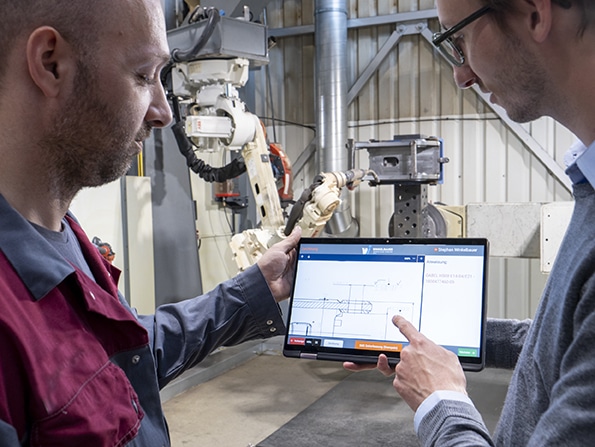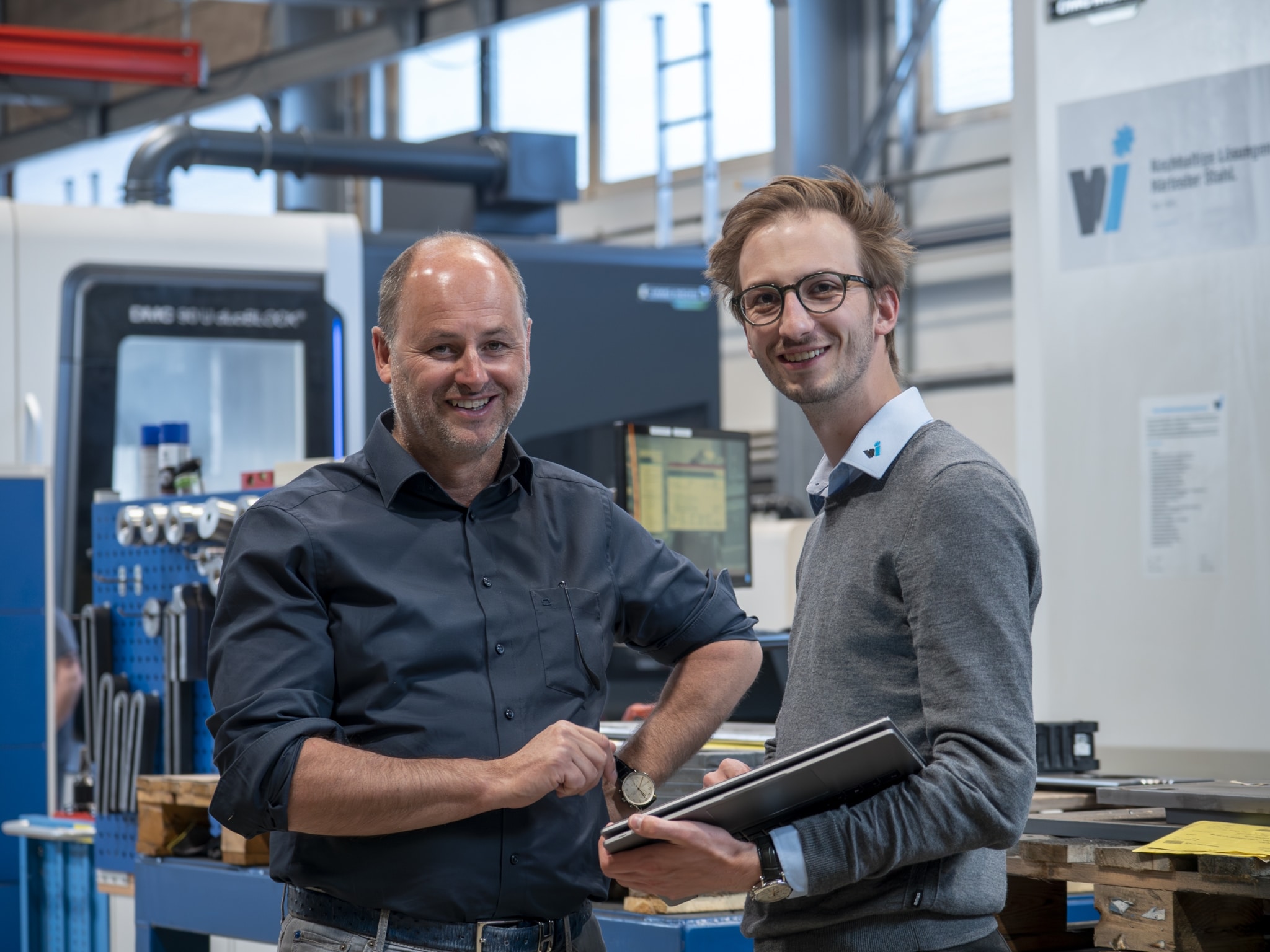Modern manufacturing solution and innovative processes
TULIP – a customised app
With the no-code platform TULIP from DMG MORI, we have succeeded in creating innovative and digital processes in our production. For example, the APPS created with TULIP support paperless production, reduce training costs and increase process reliability. Our approaches were explained by DMG MORI in a comprehensive report.

Tailor-made apps for holistic digitalisation
Innovative thinking is not only a major issue for our products. In production too, we have always taken a forward-looking approach to making a wide range of processes as efficient and smart as possible. This includes state-of-the-art welding robots from ABB and IGM, four machines from DMG MORI and now also the TULIP no-code platform from DMG MORI. DMG MORI’s Technology Excellence Magazine provides insights into process optimisation with customised apps for detailed work instructions. This component is not only an important part of Winkelbauer GmbH’s digitalisation strategy, it also ensures precise documentation of the work steps in addition to process reliability. There are currently several hundred applications – from work instructions to test reports.
“Thanks to TULIP, we have already been able to make a large number of our processes completely paperless – from assembly and cycle time recording to quality assurance.
This digitalisation step has also enabled us to drastically reduce the amount of training required for machine operation.”
Michael & Stephan Winkelbauer

The roots of Winkelbauer GmbH from Anger in Styria go back to the 19th century – back then as a blacksmith and wagon maker. Today, Winkelbauer employs around 150 experienced specialists who manufacture high-quality work tools and equipment for construction machinery and components for recycling plants. The traditional company guarantees high product quality with a powerful and modern machine park, which includes three DMG MORI machining centres. Winkelbauer is also placing a strategic focus on digitalisation in order to optimise processes and respond better to customer requirements and changes in the market. DMG MORI’s no-code platform TULIP makes an important contribution to this strategy. For example, the apps created with TULIP support paperless production, reduce training costs and increase process reliability in assembly.
Innovation for generations
Over several generations, Winkelbauer has grown into one of the largest industry specialists in Central Europe. “With ongoing investment in the training and further education of our specialists and our expertise in the processing of highly wear-resistant steel – over 6,000 tonnes per year, a good 4,000 tonnes of which are wear-resistant Hardox® steels – we are successfully holding our own against the competition,” says Michael Winkelbauer, managing director of the company founded by his grandfather, explaining the company’s success. This tradition has resulted in great innovative strength, which has already produced its own patents and brands. “In our think tank, we are always looking for special solutions for special challenges.”
Modern manufacturing solutions and innovative processes
Winkelbauer’s innovative thinking is reflected both in its products and in its production processes. “In order to remain competitive, we have always pursued future-orientated paths that enable us to make our processes more efficient,” says Michael Winkelbauer, referring to the technologies used. This includes state-of-the-art welding robots from ABB and IGM as well as advanced CNC machines from DMG MORI. Since 2021, two DMC 90 U duoBLOCK machines, a DMF 360 five-axis milling machine and a CLX 550 lathe have been put into operation.
With TULIP to paperless processes
Digitalisation has been another building block in the innovation-driven strategy for several years. “Our goal was to make all processes paperless, from order receipt to delivery,” explains Stephan Winkelbauer, responsible for digitalisation in the production process. He is the fourth generation to work in the family business. The TULIP no-code platform, which Winkelbauer also introduced with the purchase of the DMG MORI machines, is playing an increasingly important role in this process.
TULIP app enables step-by-step work instructions
Winkelbauer implemented the first TULIP application on a new welding robot from ABB. “Our primary goals here were a paperless process and less training,” recalls Stephan Winkelbauer. As the robot’s programmer knows the requirements best, he created a
TULIP app, which provides detailed work instructions for operating the welding robot – step by step. “Previously, this information was stored in space-consuming folders, requiring a lot of time and effort to find and ultimately not always up to date. Now there is a PC in each of the two robot cells, which displays everything very clearly.” As every instruction from the TULIP app has to be confirmed before the robot is operated, it is ensured that all steps are carried out reliably and documented at the same time.
Training newcomers in just a few days instead of weeks
Stephan Winkelbauer is also satisfied with the reduced training effort: “If necessary, we can also train lateral entrants relatively quickly to operate the welding robot and schedule them into production.” It used to take weeks to train new personnel in this area, but now it only takes a few days. “This speed also gives us a competitive advantage.” What’s more, this process is scalable with TULIP: “We can transfer everything 1:1 to another welding robot, for example.”
Assembly instructions including test report and cycle time recording
Another example of TULIP’s process optimisation is the assembly of a series product. This is available in 27 variants, which leads to many different serial and article numbers as well as product data that is recorded on a type plate. “We have created and continuously developed a TULIP app that supports the entire assembly process,” explains Stephan Winkelbauer. The data in the safety & quality stamp is used to record and identify the component from pre-assembly. During main assembly, a visual and functional inspection is carried out, which the fitter documents in TULIP. “We use this to create an initial test report.” During assembly, the app also explains the necessary steps. Detailed schematic drawings are also stored for this purpose. “We have gradually integrated more and more functionalities into the TULIP app that serve to optimise the assembly process – right through to cycle time recording,” says Stephan Winkelbauer.
TULIP as an important building block in the digitalisation strategy
“We already use apps similar to the two shown here in warehouse management and quality control,” says Stephan Winkelbauer, giving further examples. He believes it is important to involve the staff of the respective departments at an early stage: “The team has the deepest insights and can design the apps optimally.” The creation of TULIP apps is very simple. Similar to PowerPoint, the content is inserted and placed using drag & drop. The use of TULIP so far and its ease of use have convinced Winkelbauer to find many more applications and to continue to drive digitalisation in the company with the help of the no-code platform. Michael Winkelbauer is also convinced of this: “A holistic approach to digitalisation is crucial in order to remain competitive in the long term. TULIP is an ideal addition to the ongoing modernisation of our company.”
